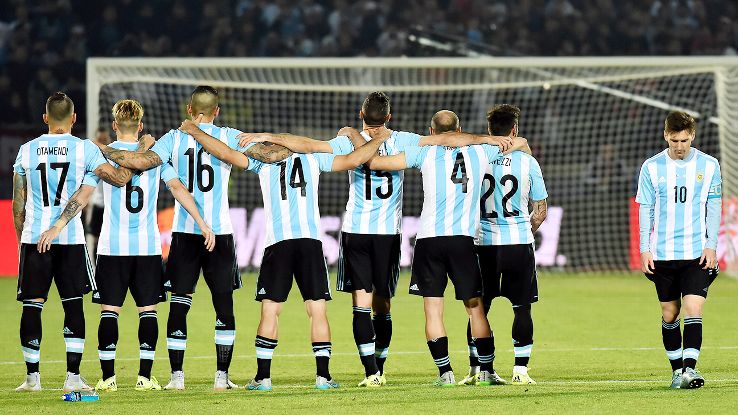For Argentina, this must have felt like a cruel re-run of last year's World Cup. The stand-out feature of the team is, of course, its individual fire power. But just as in Brazil 2014, the big-name stars looked short on gas when it really mattered. The joy in their legs that was present against Colombia, and particularly in the semifinal rout of Paraguay, had disappeared.
After a promising start to the final, Angel Di Maria broke down with an injury, just as he did last year. Lionel Messi was once again a player of sporadic flashes rather than the little genius who, at his best, exerts such a control on the game. And, just as in last year's final against Germany, there was a wasted chance that fell to Gonzalo Higuain.
Twelve months ago, Higuain spurned an opportunity when he badly missed a shot from close range against the Germans. This time, the moment came right at the end of the 90 minutes, when Argentina launched a counter-attack. Messi fed Ezequiel Lavezzi (a first-half replacement for Di Maria) who rolled a pass toward the far post. Straining to arrive on time, Higuain couldn't quite turn the ball inside the post. The more-mobile Sergio Aguero may well have gotten there but he had been replaced by Higuain, an understandable switch given the context of the match.
This was a game that promised to turn into an attacking feast between two front-loaded sides who attack better than they defend. It never quite turned out that way, partly through end-of-season exhaustion and partly through the precautions taken to neutralise the opponent.

Chile coach Jorge Sampaoli found a way to play three at the back and retain playmaker Jorge Valdivia; he dropped Marcelo Diaz into his defensive line. This meant that the back three, Francisco Silva, Diaz and Gary Medel, were all converted midfielders. It was a gamble; all received yellow cards in the first half, two of them for fouls after diving in on the wrong side -- the type of mistake that midfielders can get away with but can prove fatal when committed by defenders.
An Argentina side capable of sustaining a better second-half rhythm might have been able to turn those yellows into reds, but this Argentina side looked heavy in the legs. In some of the early Copa America games, coach Gerardo Martino had complained of his team's inability to keep going for 90 minutes. They were dominating most of the matches but suffering at the end. This time, they were unable to exert domination. The clear first half chances fell to Argentina: Aguero's header from a Messi free kick forced a reflex save from Claudio Bravo, and after being set up by Javier Pastore, Lavezzi shot straight at the keeper. But there was no concerted pressure.
Pastore looked like he has so often in this tournament, taking good advantage of the space left and pressure taken by Messi dropping deep or dragging the defence around. But Pastore faded in the end and was brought off after 80 minutes. His replacement, Ever Banega, initially improved matters, knitting the side together with his passing. It helped because the problem was that Argentina were so stretched out. This problem had forced the substitution of Aguero; left isolated from his teammates, he was receiving the ball back to goal without a teammate close to him.
Given this context, introducing the taller and more physical Higuain made sense. In hindsight, though, it did not turn out well with that missed chance at the end of normal time and, of course, with Argentina's first missed penalty in the shoot-out, blazed high over the bar by Higuain.
And so Argentina's run without a senior title goes on. One man who must be feeling cursed is Javier Mascherano. Eleven years ago, just past his 20th birthday, he was superb against Brazil in the final of the 2004 Copa America. At 2-1 up, Argentina seemed to have the title in the bag, until Adriano equalised with precisely four seconds remaining. Dazed and confused after that goal, Argentina lost that penalty shoot-out. Last year, of course, there was the 1-0 defeat to Germany in the World Cup final and now, by the dubious virtue of another spot kick contest, he has come close to a title once more, only to fall at the last hurdle.
At 31, time might be running out for Mascherano. His big-name teammates, though, should have at least one more cycle, one more World Cup and Copa America to break the drought. But priority must revolve around to the introduction of more defensive pace. With some speed at the back, Argentina could have pressed more effectively against Chile and turned slight first-half superiority into stranglehold.
Argentina defended well in their own penalty area; Alexis Sanchez put two good chances wide, and other than watching those efforts, goalkeeper Sergio Romero had little to do. In front of him, shots were blocked and good interceptions were made. But an Argentina team with the pace to trust itself to defend higher up the field would keep more compact, and therefore, get better value for its individual stars.
But on Saturday night, as they watched the Chilean players celebrate at long last, the Argentines could be forgiven for wondering if their own moment will ever come.
0 komentar:
Post a Comment